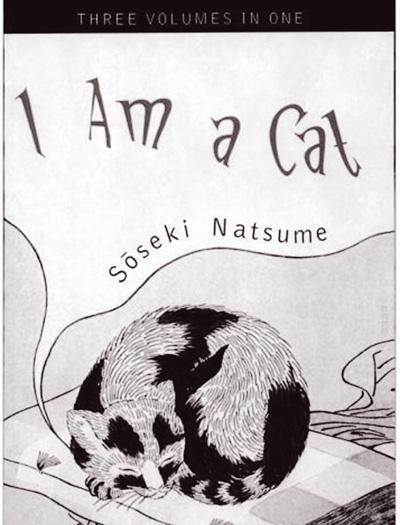狗年谈猫
2018-05-22王伟滨
王伟滨

鸡年末尾,陈凯歌以一部《妖猫传》撞开了狗年的大门。鸡犬相随,妖猫却来插上一爪,也算是这畜生不安分性格的一个小小体现吧。
钱钟书《管锥编》有一则,论及“鸡犬升天,而猫独不去”的典故:话说,当年大汉朝淮南王刘安服仙丹飞升,“余药器置于中庭,鸡犬舐啄之,尽得升天”,猫虽同样“舐啄”,却并不随鸡犬而去,盖因,“猫认屋,狗认人”1。鸡犬都是跟在主人身后,或讨便宜,或被支使,而猫却不然,它认为自己就是屋子的主人,既是主人,当然不会随便离去了。
猫天生就是个特立独行的角色,总是与“常规”发生些抵牾。因为猫的传染,养猫之人也多少与“常人”有所不同。我有个美国朋友舒尔茨教授(Elizabeth Schultz),八十多岁的老太太,孑然一身,只与猫儿为伴。虽是一人,却并无孤独寂寥之感,行事决断、利落。静,能在书山中悦读;动,则能在高速路上驱车飞驰。前日来信,报告她家猫儿近况,有如下妙语:“Eddy, after some months of sickness (a yeast infection in his ear which interfered with his respiratory system), is well and is eager to chase strings, feather, fluff balls from here to there. He will get even with all the dogs who are promoting The Year of the Dog when The Year of the Tiger arrives.”【艾迪病了几个月(耳朵里真菌感染,又影响了呼吸系统),现已痊愈,每天忙着四处追绳子、羽毛或是小毛球。看着吧,等到虎年到来的时候,他再跟那些忙着推销狗年的狗儿们算账。】
在《哈利·波特》的故事中,迈高教授幻化成一只可以读报纸的猫,让一贯标榜“正常”的德斯利一家着实吃了一惊。话说德斯利家是那种最“正常”不过的人家。“They were the last people youd expect to be involved in anything strange or mysterious, because they just didnt hold with such nonsense.”(要说到奇怪或是神秘的事,那一定找不到他家人头上,因为他们根本不听这些胡说八道。)这样的人家当然是不会养猫的,他家的唯一宠物,就是胖儿子达德利:“The Dursleys had a small son called Dudley and in their opinion there was no finer boy anywhere.”2(德斯利夫妇有个小儿子,名叫达德利,在他们看来,这就是世界上最好的孩子)。

不过,就算他们百般努力,避开各种“怪力乱神”,还是被“神秘”之事找上了门:“It was on the corner of the street that he noticed the first sign of something peculiar—a cat reading a map. For a second, Mr. Dursley didnt realize what he had seen—then he jerked his head around to look again. There was a tabby cat standing on the corner of Privet Drive, but there wasnt a map in sight. What could he have been thinking of? It must have been a trick of the light. Mr. Dursley blinked and stared at the cat. It stared back. As Mr. Dursley drove around the corner and up the road, he watched the cat in his mirror. It was now reading the sign that said Privet Drive—no, looking at the sign; cats couldnt read maps or signs. Mr. Dursley gave himself a little shake and put the cat out of his mind.”3(在街角上,他注意到第一个奇怪的征兆—— 一只猫在读地图。有一秒钟,德斯利先生没有明白他看到的是什么—— 后来他扭过头去再看。有只虎斑猫正站在普利维道的角落里,但是看不见地图。他刚才想什么呢?一定是光线捣的鬼。德斯利先生眨了眨眼,又盯着那只猫看。那猫也盯着他。德斯利先生把车开过街角,上了大路,在反光镜里看那猫。现在猫在读写着“普利维道”的路牌——不对,是看那个路牌;猫是不会读地图或是路牌的。德斯利先生晃晃头,把猫的事抛到脑后。)
猫眼,虽不是皆可用来读书看报,却真有不同于凡物之处。
与其他宠物不同,猫很少仰视,哪怕是主人;经常蹿房越脊的它们,常常是居高临下地看待这个世界。古语说,“狗眼看人低”,其实这话并不对,狗看人总是仰着头的,是“看人高”才对,倒是猫眼看人才会低吧。夏目漱石有个著名小说,叫《我是猫》,可谓“猫眼看世界”的杰作。猫的眼睛,的确是看到了太多事,以至于会让人有一种恐慌之感,似乎猫天生就是间谍;不过,夏目的猫,更像是个“见怪不怪”的哲人。“世事变迁就像猫的眼珠一样变幻莫测。……年底过去了,正月过去了,花朵凋谢,新叶又生。以后世界将如何变化,我不了解,只不过,水缸中的猫的瞳孔,应该可以凝固成瞬间的永恒。”4
日本作家村上春树的作品中也有许多与猫有关。比如,在《海边的卡夫卡》中,老人中田是个专门帮人找猫的人——不知为什么会有那么多的猫平白地不知去向。在那个故事中,与那些或自以为是或茫然无知的人类相比,反倒是猫儿们配得上“理性生物”的称号。那个被人看作弱智的老人,只有在与猫儿的交流中,才能显出他的“正常”:
Cat: I must say that for a human you have an odd way of talking.
Nakada: Yes, everybody tells me that. But this is the only way Nakada can speak. I try to talk normally but this is what happens. Nakadas not very bright, you see. I wasnt always this way, but when I was little I was in an accident and Ive been dumb ever since. Nakada cant write. Or read a book or a newspaper.
Cat: Not to boast or anything, but I cant write either. Id say my mind is average, though, so Ive never found it inconvenient.
Nakada: In the cat world thats to be expected. But in the human world if you cant read or write youre considered dumb...
Cat: But youre able to talk with cats.
Nakada: thats correct.
Cat: then youre not so dumb after all.5
(猫:我得说,作为人,你说话方式有些怪呀。
中田:是,人人都这么說。但是,我只会这样说话。我想要说话正常,可说出来的话就是这样。你知道吧,中田不太聪明。我不是天生这样,小时候,我遇到个事故,后来就变蠢了。中田不会写字,也不会读书看报。
猫:不是吹,其实,我也不会写字。我觉得我的头脑算是中等水平,我也没觉得有什么不方便的。
中田:在猫儿的世界里,那挺正常。但是在人类的世界里,你要是不会读书写字,人们就说你是蠢货……
猫:但你会跟猫说话呀。
中田:这倒是。
猫:那你就不蠢呀。)
《妖猫传》原著,日本小说《沙门空海》中的妖猫,妖气极重,却并没有什么灵气。与之相比,倒是电影中的“御猫”,既有情义,又睿智了许多。“御猫”只吃鱼眼睛,伤人时,也多是伤人眼睛,想来是要提醒人们,芸芸众生,盲信“眼见为实”,实则是被自己的眼睛骗了。
其实,小说中说话冷嘲热讽,专好恶作剧害人的妖猫,更像日本传说中的狸猫,有趣的是后者在现实生活中其实是一种犬科动物——貉(raccoon dog)。这种介乎犬和猫之间的骑墙派,最大的魔力,就是忽然吓你一下。
在小泉八云的《怪谈》中有一篇“Mujina”(《狸猫》),讲了著名的“狸猫”耍弄人的故事。
有个叫纪国坂的地方,十分荒凉:“On one side of this slope you see an ancient moat(护城河), deep and very wide, with high green banks rising up to some place of gardens; —and on the other side of the road extend the long and lofty walls of an imperial palace. Before the era of street-lamps and jinrikishas(人力车), this neighborhood was very lonesome after dark; and belated pedestrians would go miles out of their way rather than mount the Kii-no-kuni-zaka, alone, after sunset. All because of a Mujina that used to walk there.”(在坂的一边,有条古老的护城河,又深又宽,绿草覆盖的高高河岸一直延伸到远处花园里;—— 路的另一边是围绕着宫殿的长长的高墙。在还没有路灯和人力车的年代,这一带天一黑下来,就特别荒凉;太阳落山后,孤身夜行的人宁愿绕行几里路,也不愿从纪国坂上走过去。这都是因为曾在附近游荡的一只狸猫)。
多年前,有个小贩从坂下路过,见到个漂亮姑娘以袖掩面在河边哭,他就上前搭讪。结果,“Then that O-jochu turned around, and dropped her sleeve, and stroked her face with her hand; —and the man saw that she had no eyes or nose or mouth,—and he screamed and ran away.”(那姑娘转过身,放下衣袖,用手抹一把脸;——小贩看见她没有眼睛、鼻子、嘴巴,—— 他吓得大叫一声,掉头就跑。)小贩魂飞魄散,吓得往坂上飞跑,终于见到个卖荞麦面的,就向这人哆嗦着讲述他的遭遇。“‘I saw... I saw a woman—by the moat;—and she showed me... Ah! I cannot tell you what she showed me!‘He! Was it anything like THIS that she showed you? Cried the soba-man, stroking his own face—which therewith became like unto an Egg... And, simultaneously, the light went out.”6(“我看见,看见个女的——就在护城河边;——她那样子……啊呀,我说不出她那样子!”“呵呵!她是这个样子吧?”卖荞麦面的大叫一声,抹了一把脸——那张脸立刻变成了鸡蛋模样……正在此时,灯光熄灭了。)
不过,电影《妖猫传》中那只誓死守护女主人的黑猫,其实并没有多少东方味道,倒更像是来自爱伦·坡;进一步说,杨贵妃的死,活埋,在棺中复活,以及再次死去等情节,也同样来自爱伦·坡。
爱伦·坡最有名的两篇小说《黑猫》(“The Black Cat”)和《厄舍古屋的倒塌》(“The Fall of the House of Usher”)为这部电影提供了两大元素——萦绕不去的黑猫和阴魂不散的美丽女人。

在《黑猫》的故事里,曾经热爱生活、整日被宠物环绕的“我”,也许因为酗酒,也许因为贫穷,也许因为纯粹恶魔附体,反正,“我”折磨甚至杀死了“我”的黑猫。不久,一只同样模样的猫又进入“我”家,像冤魂一般缠绕着“我”。一天,“我”一怒之下向猫举起斧头,却砍死了前来阻拦的妻子。“我”把妻子砌在墙内,却不见了黑猫。警察来调查时,墙壁内猫的凄厉叫声,引得大家七手八脚把墙壁拆开:“The corpse, already greatly decayed and clotted with gore, stood erect before the eyes of the spectators. Upon its head, with red extended mouth and solitary eye of fire, sat the hideous beast whose craft had seduced me into murder, and whose informing voice had consigned me to the hangman. I had walled the monster up within the tomb.”7(暴露在众人面前的是一具极度腐烂、沾满血污、直挺挺的尸体。尸体头上端坐的,正是张着血盆大口,瞪着冒火的独眼的,那头可怕的畜生。是它用诡计引诱我犯下谋杀之罪,是它用叫声把我送上绞刑架。我把这个怪物砌到坟墓中了。)
《厄舍古屋的倒塌》则说的是一对有着病态的亲密关系的兄妹,幽居在一栋阴森的老宅中;宅子一天天朽烂,兄妹两人也一天天失去生机,直到有一天,哥哥将妹妹活生生地埋入坟墓。然后,在一个风雨交加的夜晚,忽然传来敲门声……
大唐王朝,如同厄舍古屋一般,在“極乐之宴”之后摇摇欲坠,美人、宫殿都无法留住,迅速走向朽坏、破碎、消亡,但固执的猫儿却要一直守候下去……
1. 钱钟书,《管锥编》。三联书店,2008。990页。
2. J. K. Rowling. Harry Potter and the Sorcerers Stone. Scholastic, 1998. p. 1.
3. Ibid, p. 3.
4. 夏目漱石著,曹曼译,《我是猫》。浙江文艺出版社,2015。附录,“夏目漱石说”。
5. Haruki Murakami, trans. Philip Gabriel. Kafka on the Shore. Vintage, 2005. p. 51.
6. 引自kindle版,无页码。
7. Edgar Allan Poe, Selected Tales. Penguin Popular Classics, 1994. p. 321.
